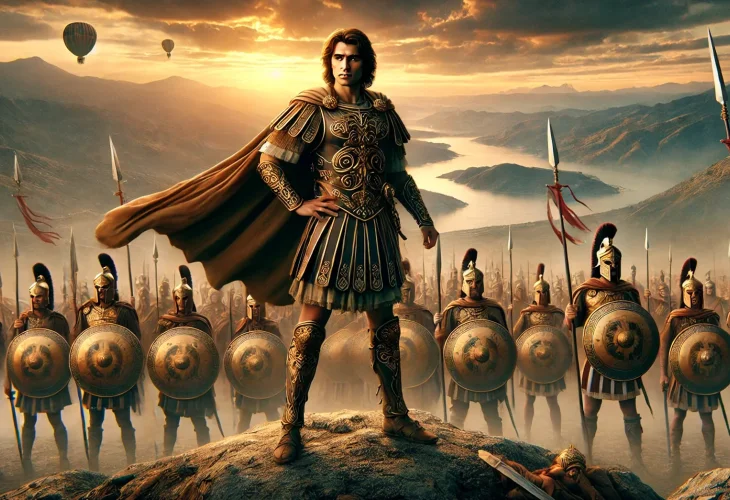The Alexander Phenomenon: How a Young Macedonian Changed History
For generations, Greeks and Persians were locked in a fierce war—until one young man tipped the scales and altered the world's course. Meet Alexander.

As we approach the celebration of Chanukah, a time when we commemorate the victory of Jewish faith over Greek culture, let's take a look back at the history of Greek civilization and its conflicts with Judaism throughout the ages.
Noah's grandfather blessed his second son, "May Hashem beautify Japheth." The entire European culture, which places beauty and aesthetics at its center, is a product of Greek civilization. Even before there were cultured societies in Rome, Germany, France, Spain, and the rest of Europe, Athens was already a city brimming with philosophers and scholars.
The scholars of Athens developed philosophy, geometry, mathematics, and many other fields of study. Thales, considered by Aristotle as the first Greek philosopher, lived around the middle of the sixth century BCE, around the time of the destruction of the First Temple. He was one of the "Seven Sages of Greece," mentioned by Socrates as founding figures of Greek wisdom. Following him were Pythagoras, Protagoras, Parmenides, and other famous thinkers. About a century later, the great philosopher Socrates, considered the "wisest man in the world" at his time, lived and taught two of the most famous philosophers in history: Aristotle and Plato. Aristotle and Plato developed two distinct philosophical schools of thought, which significantly influenced the world of philosophy for more than two thousand years.
At that time, the Persian Empire dominated the Middle East, having conquered and replaced the Babylonian Empire. There was a prolonged, generational war between Greeks and Persians. The Persians ruled a vast empire with an unimaginable number of soldiers and mercenaries. In contrast, the Greeks were comprised of many fiercely independent warrior tribes, forming alliances from time to time, succeeding occasionally to defeat the Persians, but never in a position to conquer Persia or even threaten it.
Until a young man arrived who tipped the scales and changed the course of the world. This was Alexander, who was not Greek at all. He was the son of Philip, King of Macedonia. Macedonia was located by the Aegean Sea, in what is now Turkey, east of Greece. Macedonia was relatively less developed compared to Greece, and Greeks did not regard it as one of them. When Alexander was 13, Philip invited the Greek scholar Aristotle to be his private tutor. This was early in Aristotle's career, before he became very famous.
At the age of 20, Alexander's father was assassinated, and Alexander became King of Macedonia. In just a few years, he liberated many cities from Persian rule, subdued cities in Greece that had rebelled against him, conquered Tyre and Sidon, the Land of Israel, Egypt, and became the ruler of all lands west of Persia before turning to attack Persia itself. Through a series of battles, he subdued the Persian kingdom, destroyed the Persian army under Darius, and captured the imperial cities of Babylon and Susa. He then moved eastward, conquering territories that are now part of Uzbekistan, Kazakhstan, and Afghanistan, extending his conquest to parts of India, battling warriors on elephants—an animal unknown to the Western world at the time. Alexander returned to Babylon as a conqueror and king of the world, dying there at the age of 33, before he could fully enjoy his vast empire.
However, the changes that transpired in the world were profoundly significant. For the first time since the Tower of Babel, a single empire ruled over most of the known inhabited world. Many great kings had imposed their terror across the globe; even King Ahasuerus ruled over 127 countries. But, unlike others, the Greek conquest spread Greek culture throughout the world, instituting a cultural shift known as "Hellenism," named after the Greek people, the "Hellenes." Hellenism disseminated Greek culture across the ancient world, marking its introduction to history.

